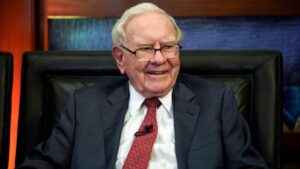Warren Buffett Just Sold 2 S&P 500 ETFs — Does That Mean Bad News for the Stock Market?


Warren Buffett’s decision to sell two major S&P 500 ETFs, the SPDR S&P 500 ETF Trust (SPY) and the Vanguard S&P 500 ETF (VOO), has triggered anxiety and uncertainty among investors. As the legendary CEO of Berkshire Hathaway, Buffett’s moves are often seen as signals for market trends.
Advertisement: High Yield Savings Offers
Find Out: The 5 Car Brands Named the Least Reliable of 2025
However, while it’s tempting to interpret this sale as a warning that a major downturn is coming, there are strong reasons to believe Buffett’s actions reflect a long-standing philosophy of discipline and valuation awareness, not panic.
Here’s why the broader market outlook may not be as dire as some fear.
But if you are worried, take a look at some strategies investors are using during market turbulence.
Throughout his career, Buffett has emphasized patience, discipline and a reluctance to chase overheated markets. His recent selling fits within that playbook.
Eugenia Mykuliak, founder and executive director of B2PRIME Group, said, “His move right now may just be an indicator of the increased selectivity and discipline he’s been talking about for years.”
Rather than making a fear-driven exit from the market, Buffett appears to be strategically reallocating capital — a key distinction.
Learn More: 15 Investments Warren Buffett Regrets
One factor likely behind Buffett’s decision is the current high valuation of the U.S. stock market. Metrics like the Shiller P/E ratio (CAPE) remain well above historical averages, suggesting that future returns could be muted.
“If metrics like the Shiller P/E (CAPE) remain high for an extended period, it could cause concerns,” Mykuliak explained.
However, she added that today’s valuations are not as extreme as the levels seen before the dot-com crash or even the post-COVID-19 pandemic surge.
Vince Stanzione, CEO and founder at First Information, pointed out that Berkshire Hathaway has been steadily raising its cash reserves, suggesting Buffett sees few compelling opportunities at today’s prices.
“The reason for the high cash pile is likely a lack of opportunities and what is still an expensive market even after the recent falls,” Stanzione said.
While these signals have raised concern among some investors, experts like Stanzione suggest they’re more indicative of a challenging environment for outsized returns and not necessarily signs of an imminent market collapse.
While Buffett’s moves naturally attract headlines, investors should resist the urge to react emotionally or interpret his strategy as a signal to abandon index investing.
Mykuliak emphasized that broad market index funds like the S&P 500 remain a solid strategy for long-term investors with a 10-plus year time horizon.
“Broad market index funds, such as the S&P 500, still remain one of the most effective ways to build long-term wealth,” she said.
Still, investors should be aware of the risks that come with heavy S&P 500 exposure today.
“Buy and hold index fund buyers are likely taking more risk than they are aware of,” Stanzione explained, noting that large-cap tech stocks dominate the index.
Diversifying into sector ETFs or even gold ETFs can help balance portfolios, especially if the next decade delivers more modest returns.
The key takeaway from expert commentary: Individual investors may be better off focusing on their own financial goals and risk tolerance, rather than trying to mirror the moves of a multi-billion-dollar corporation like Berkshire Hathaway.
Warren Buffett’s sale of S&P 500 ETFs should be seen as a strategic adjustment in response to market valuations, not an omen of disaster. While the market outlook may be less favorable than it was a few years ago, patient, diversified investing remains the best path forward.
As Mykuliak put it: “Rest easy, don’t panic. Markets always move in cycles.”
More From GOBankingRates
Sources
-
Eugenia Mykuliak, B2PRIME Group
-
Vince Stanzione, First Information
This article originally appeared on GOBankingRates.com: Warren Buffett Just Sold 2 S&P 500 ETFs — Does That Mean Bad News for the Stock Market?








